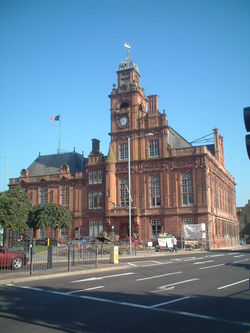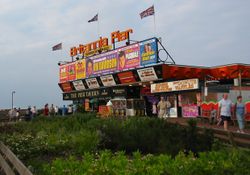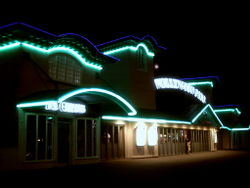Great Yarmouth
2007 Schools Wikipedia Selection. Related subjects: Geography of Great Britain
- There are other places named Yarmouth.
| Great Yarmouth | ||
|---|---|---|
|
|
||
| Statistics | ||
| Population: | 47,288 | |
| Ordnance Survey | ||
| OS grid reference: | TG5207 | |
| Administration | ||
| District: | Great Yarmouth | |
| Shire county: | Norfolk | |
| Region: | East of England | |
| Constituent country: | England | |
| Sovereign state: | United Kingdom | |
| Other | ||
| Ceremonial county: | Norfolk | |
| Historic county: | Norfolk | |
| Services | ||
| Police force: | Norfolk Constabulary | |
| Fire and rescue: | {{{Fire}}} | |
| Ambulance: | East of England | |
| Post office and telephone | ||
| Post town: | GREAT YARMOUTH | |
| Postal district: | NR30 (north), NR31 (south) | |
| Dialling code: | 01493 | |
| Politics | ||
| UK Parliament: | Great Yarmouth | |
| European Parliament: | East of England | |
Great Yarmouth, often known to locals simply as Yarmouth, is an English coastal town in the county of Norfolk. It is situated at the mouth of the River Yare, some 30km east of the city of Norwich and 18 km north of the Suffolk town of Lowestoft.
Great Yarmouth has been a seaside resort since 1760, and is the gateway from the Norfolk Broads to the sea. For hundreds of years it has been a fishing port dependent on the herring fishery, and today it services the offshore oil rigs. The town has a popular beach and two promenades popular with locals and tourists.
The town itself is actually located on a thin spit of land sandwiched between the North Sea and River Yare. It is home to the historic rows and the main tourist sector on the seafront. The area is linked to Gorleston, Cobholm and Southtown by Haven Bridge and to the A47 and A12 by the Breydon Bridge.
The unparished urban area that makes up the town of Great Yarmouth has an area of 26.54 km² and according to the Office for National Statistics 2002 had a population of 47,288. It is the main town in the larger Borough of Great Yarmouth. The ONS identify a Great Yarmouth Urban Area, which has a population of 66,788, including the sub-areas of Caister-on-Sea (8,756) and Great Yarmouth (58,032). The wider borough of Great Yarmouth has a population of around 92,500.
Great Yarmouth is the fifth most deprived area in the country, in terms of social, economic, education, and safety.
History
Yarmouth (Gernemwa, Yernemuth) lies near the site of the Roman camp of Gariannonum at the mouth of the river Yare, the convenience of its situation having attracted many fishermen from the Cinque Ports, a permanent settlement was made, and the town numbered 70 burgesses before the Norman Conquest. Henry I placed it under the rule of a reeve. The charter of King John ( 1208), which gave his burgesses of Yarmouth general liberties according to the customs of Oxford, a gild merchant and weekly hustings, was amplified by several later charters asserting the rights of the borough against Little Yarmouth and Gorleston. In 1552 Elizabeth granted a charter of admiralty jurisdiction, afterwards confirmed and extended by James I. In 1668 Charles II incorporated Little Yarmouth in the borough by a charter which with one brief exception remained in force until 1703, when Anne replaced the two bailiffs by a mayor.
A grammar school was founded in 1551, when the great hall of the old hospital, founded in the reign of Edward I by Thomas Fastolfe, was appropriated to its use. It was closed from 1757 to 1860, was re-established by the charity trustees, and settled in new buildings in 1872.
From 1808 to 1814 the Admiralty in London could communicate with its naval ships in the port of Great Yarmouth by means of a shutter telegraph chain.
The town was the site of a drowning tragedy on May 2, 1845 when a suspension bridge crowded with children collapsed under the weight killing 79 people. They had gathered to watch a clown in a barrel being pulled by geese down the river. As he passed under the bridge the weight shifted, causing the chains on the south side to snap, tipping over the bridge deck. The town suffered from bombing during World War II, but much is left of the old town, including the original over 2000 metre long protective mediaeval wall, of which about two-thirds has survived. Of the 18 towers, 11 are left. On the South Quay, there is a 17th century Merchant's House, as well as Tudor, Georgian and Victorian buildings. Behind South Quay, there is a maze of alleys and lanes known as "The Rows". Originally there were 145 rows. Despite war damage, several have remained.
The northern section of the two-mile £19m A47 Great Yarmouth Western Bypass opened in March 1986, and the southern section opened in May 1985. It is now the A12.
Sights
The Tolhouse, complete with dungeons, dates from the late 13th century and is said to be the oldest civic building in Britain. It backs onto the town's central library which was recently rennovated.
The Market place is one of the largest in England, and has been operating since the 13th century. It is also home to the town's shopping sector and the famous Yarmouth chip stalls. The smaller area south of the market has a big screen which is used for showing GYTV and access to the town's shopping centre, Market Gates.
Great Yarmouth railway station, which serves the town, is the terminus of the Wherry Lines from Norwich. Before the Beeching Axe the town had a number of stations and a direct link to London down the east coast. The only remaining signs of these stations is the coach park where Beach Station once was and the A12 relief road which follows the route of the railway down into the embankment from Breydon Bridge.
Yarmouth has two piers, Britannia Pier and Wellington Pier. The latter of the two was demolished in 2005 and is currently being rebuilt as a family entertainment centre. Britannia Pier is home to the Britannia Theatre and a fair at the end of the pier.
The Grade 1 listed Winter Gardens building sits next to the Wellington Pier. The cast iron framed glass structure was shipped by barge from Torquay in 1903. It is said this was done without the loss of a single pane of glass. Over the years, it has been used as ballroom, roller skating rink and beer garden. In the 1990s it was converted into a nightclub by comedian Jim Davidson. Today, Winter Gardens is under use as a family leisure venue, although its future is under threat due to repair costs off the aging framework. During the winter of 2005 there were worries of the collapse of the building and during high winds it was often closed.
There a monument to Horatio Nelson, erected in 1819, 24 years before the completion of Nelson's Column in London, and now surrounded by factories. The monument, that of Britannia seated with shield and trident, faces away from the sea leading to the popular assumption of a mistake during construction. However it was actually built to face Nelson's Norfolk birthplace at Burnham Thorpe. The monument, known as the Britannia Monument is similar in form but about 2/3 the size of its Trafalgar Square counterpart, was originally planned to mark Nelson's victory at the Nile, but fundraising was not completed until after his death and it was instead dedicated to the "Lord Admiral".
Charles Dickens used Yarmouth as a key location in his novel David Copperfield. Anna Sewell (1820-1878), the author of Black Beauty, was born in a 17th-century house in Church Plain. The house is currently up for sale.
The Time and Tide museum on Blackfriars Road which is managed by Norfolk Museums Service was nominated in the UK Museums Awards in 2005. It was built as part of the regeneration of the south of the town in 2003. Its location in an old herring smokery harks back to the towns status as a major fishing port. Sections of the historic town wall are located outside the museum.
Church of St Nicholas
The church of St. Nicholas, often said to be the largest parish church in England, was founded in by Herbert Losinga, the first bishop of Norwich, and consecrated in 1119. It is cruciform, with a central tower, which perhaps preserves a part of the original structure, but by successive alterations the form of the church has been completely changed. The Transitional clerestoried nave, with columns alternately octagonal and circular, was rebuilt in the reign of King John. A portion of the chancel is of the same date. About fifty years later the aisles were widened, so that the nave is now the narrowest part of the building.
A grand west front with towers and pinnacles was constructed in 1330- 1338, but the building was interrupted by a visitation of the plague. In the 16th century the ornamental brasses were cast into weights and the gravestones cut into grindstones. Within the church there were at one time 18 chapels, maintained by guilds or private families, but these were demolished by the Reformers, who sold the valuable utensils of the building and applied the money to the widening of the channel of the harbour.
During the Commonwealth the Independents appropriated the chancel, the Presbyterians the north aisle, and the Churchmen were allowed the remainder of the building. The brick walls erected at this time to separate the different portions of the building remained till 1847. In 1864 the tower was restored, and the east end of the chancel rebuilt; in 1869- 1870 the south aisle was rebuilt; and in 1884 the south transept, the west end of the nave and the north aisle underwent restoration. The width of the nave is 26 ft, and the total length of the church is 236 ft.
St. Nicholas was bombed and nearly destroyed by fire during World War II. It has been rebuilt.
Sports and leisure
Yarmouth has an important horseracing track which features a chute allowing races of one mile on the straight.
The local football team are Great Yarmouth Town F.C.



